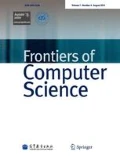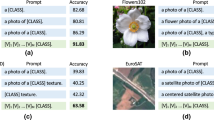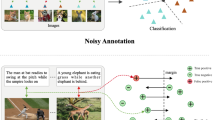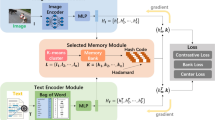Abstract
Recently, addressing the few-shot learning issue with meta-learning framework achieves great success. As we know, regularization is a powerful technique and widely used to improve machine learning algorithms. However, rare research focuses on designing appropriate meta-regularizations to further improve the generalization of meta-learning models in few-shot learning. In this paper, we propose a novel meta-contrastive loss that can be regarded as a regularization to fill this gap. The motivation of our method depends on the thought that the limited data in few-shot learning is just a small part of data sampled from the whole data distribution, and could lead to various bias representations of the whole data because of the different sampling parts. Thus, the models trained by a few training data (support set) and test data (query set) might misalign in the model space, making the model learned on the support set can not generalize well on the query data. The proposed meta-contrastive loss is designed to align the models of support and query sets to overcome this problem. The performance of the meta-learning model in few-shot learning can be improved. Extensive experiments demonstrate that our method can improve the performance of different gradient-based meta-learning models in various learning problems, e.g., few-shot regression and classification.
Similar content being viewed by others
References
Finn C, Abbeel P, Levine S. Model-agnostic meta-learning for fast adaptation of deep networks. In: Proceedings of the 34th International Conference on Machine Learning. 2017, 1126–1135
Snell J, Swersky K, Zemel R S. Prototypical networks for few-shot learning. 2017, arXiv preprint arXiv: 1703.05175
Tian P, Wu Z, Qi L, Wang L, Shi Y, Gao Y. Differentiable meta-learning model for few-shot semantic segmentation. Proceedings of the AAAI Conference on Artificial Intelligence, 2020, 34(7): 12087–12094
Goodfellow I, Bengio Y, Courville A. Deep Learning. Cambridge: MIT Press, 2016
Kingma D P, Welling M. Auto-encoding variational bayes. 2014, arXiv preprint arXiv: 1312.6114
Srivastava N, Hinton G, Krizhevsky A, Sutskever I, Salakhutdinov R. Dropout: a simple way to prevent neural networks from overfitting. The Journal of Machine Learning Research, 2014, 15(1): 1929–1958
Chen T, Kornblith S, Norouzi M, Hinton G E. A simple framework for contrastive learning of visual representations. In: Proceedings of the 37th International Conference on Machine Learning. 2020, 1597–1607
He K, Fan H, Wu Y, Xie S, Girshick R. Momentum contrast for unsupervised visual representation learning. In: Proceedings of 2020 IEEE/CVF Conference on Computer Vision and Pattern Recognition. 2020, 9726–9735
Vinyals O, Blundell C, Lillicrap T, Kavukcuoglu K, Wierstra D. Matching networks for one shot learning. In: Proceedings of the 30th International Conference on Neural Information Processing Systems. 2016, 3637–3645
Sung F, Yang Y, Zhang L, Xiang T, Torr P H S, Hospedales T M. Learning to compare: relation network for few-shot learning. In: Proceedings of 2018 IEEE/CVF Conference on Computer Vision and Pattern Recognition. 2018, 1199–1208
Ravi S, Larochelle H. Optimization as a model for few-shot learning. In: Proceedings of the 5th International Conference on Learning Representations. 2017
Santoro A, Bartunov S, Botvinick M, Wierstra D, Lillicrap T. One-shot learning with memory-augmented neural networks. 2016, arXiv preprint arXiv: 1605.06065
Lee H B, Lee H, Na D, Kim S, Park M, Yang E, Hwang S J. Learning to balance: bayesian meta-learning for imbalanced and out-of-distribution tasks. 2020, arXiv preprint arXiv: 1905.12917
Raghu A, Raghu M, Bengio S, Vinyals O. Rapid learning or feature reuse? towards understanding the effectiveness of MAML. In: Proceedings of the 33rd Conference on Neural Information Processing Systems. 2019
Lee K, Maji S, Ravichandran A, Soatto S. Meta-learning with differentiable convex optimization. In: Proceedings of 2019 IEEE/CVF Conference on Computer Vision and Pattern Recognition. 2019. 1064: 9–10657
Bertinetto L, Henriques J F, Torr P H S, Vedaldi A. Meta-learning with differentiable closed-form solvers. In: Proceedings of the 7th International Conference on Learning Representations. 2019
Sinha A, Malo P, Deb K. A review on bilevel optimization: from classical to evolutionary approaches and applications. IEEE Transactions on Evolutionary Computation, 2018, 22(2): 276–295
Balaji Y, Sankaranarayanan S, Chellapp, R. MetaReg: towards domain generalization using meta-regularization. In: Proceedings of the 32nd International Conference on Neural Information Processing Systems. 2018, 1006–1016
Tseng H Y, Chen Y W, Tsai Y H, Liu S, Lin Y Y, Yang M H. Regularizing meta-learning via gradient dropout. In: Proceedings of the 15th Asian Conference on Computer Vision. 2020, 218–234
Jaiswal A, Babu A R, Zadeh M Z, Banerjee D, Makedon F. A survey on contrastive self-supervised learning. Technologies, 2021, 9(1): 2
van den Oord A, Li Y, Vinyals O. Representation learning with contrastive predictive coding. 2018, arXiv preprint arXiv: 1807.03748
Tschannen M, Djolonga J, Rubenstein P K, Gelly S, Lucic M. On mutual information maximization for representation learning. In: Proceedings of the 8th International Conference on Learning Representations. 2020
Franceschi L, Frasconi P, Salzo S, Grazzi R, Pontil M. Bilevel programming for hyperparameter optimization and meta-learning. In: Proceedings of the 35th International Conference on Machine Learning. 2018, 1568–1577
Cortes C, Vapnik V. Support-vector networks. Machine Learning, 1995, 20(3): 273–297
Kingma D, Ba J. Adam: a method for stochastic optimization. In: Proceedings of the 3rd International Conference for Learning Representations. 2015
Ren M, Triantafillou E, Ravi S, Snell J, Swersky K, Tenenbaum J B, Larochelle H, Zemel R S. Meta-learning for semi-supervised few-shot classification. In: Proceedings of the 6th International Conference on Learning Representations. 2018
Krizhevsky A, Sutskever I, Hinton G E. ImageNet classification with deep convolutional neural networks. In: Proceedings of 26th Annual Conference on Neural Information Processing Systems. 2012, 1106–1114
Oreshkin B N, Rodriguez P, Lacoste A. TADAM: task dependent adaptive metric for improved few-shot learning. In: Proceedings of the 32nd International Conference on Neural Information Processing Systems. 2018, 719–729
Welinder P, Branson S, Mita T, Wah C, Schroff F, Belongie S, Perona P. Caltech-UCSD birds 200. CNS-TR-2010-001. Pasadena: California Institute of Technology, 2010
Chen W Y, Liu Y C, Kira Z, Wang Y C F, Huang J B. A closer look at few-shot classification. In: Proceedings of the 7th International Conference on Learning Representations. 2019
Acknowledgements
This work was supported in part by the Science and Technology Innovation 2030 “New Generation Artificial Intelligence” Major Project (2018AAA0100905).
Author information
Authors and Affiliations
Corresponding author
Additional information
Pinzhuo Tian is currently working towards his PhD degree with the State Key Lab for Novel Software Technology, Department of Computer Science Technology, Nanjing University, China. His research interests lie in machine learning, including meta-learning and transfer learning.
Yang Gao received his PhD degree from the Department of Computer Science and Technology of Nanjing University, China in 2000. He is a professor at the Department of Computer Science and Technology, Nanjing University, China. His research interests include artificial intelligence and machine learning. He has published more than 100 papers in top conferences and journals in and outside of China. He is a member of IEEE.
Rights and permissions
About this article
Cite this article
Tian, P., Gao, Y. Improving meta-learning model via meta-contrastive loss. Front. Comput. Sci. 16, 165331 (2022). https://doi.org/10.1007/s11704-021-1188-9
Received:
Accepted:
Published:
DOI: https://doi.org/10.1007/s11704-021-1188-9




